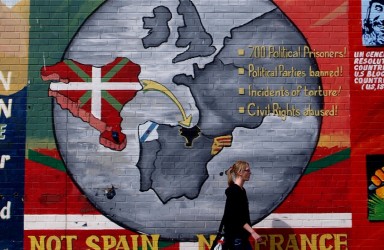Dutch Tolerance: Something to Learn from?
In the age of intensified globalization and migration, societies are increasingly confronted with problems of integration and peaceful coexistence of religiously or otherwise ethnically different groups, particularly of groups identifying themselves with Western traditions on the one hand and the world of Islam on the other. Tolerance is an important element to meet these requirements.
Why has the demobilisation of combatants proved so difficult? The Colombian paramilitary experience
The demobilisation of combatants during or after conflict is a crucial step towards achieving sustainable peace. This essay draws on the case of Colombia to illustrate the difficulties that this task poses.
The Question of Identity: The EU/Turkey Integration Debate
The eastward expansion of the EU has shown the flexibility of what is European. The future integration of Turkey is the next step towards increasing recognition that the values that unite Europe are indeed universal, and that therefore, European identity cannot be culturally or territorially bounded.
Negotiation: The Challenge of Achieving a Long-term Relationship
Tough economic times have presented negotiators globally with new challenges both in business deal-making and conflict resolution. Long-term relationships are becoming cost and time effective as they open the way for future multiple synergies, against short-termed visions or one-sided interests.
Why has a negotiated settlement been possible in Northern Ireland and not the Basque conflict?
A case can be made that a negotiated settlement has been possible in Northern Ireland due to an inclusive political strategy and acceptance of compromise, whereas the Basque situation has not been conductive to a settlement due to the government pursuing an exclusionary position towards ETA and radical nationalist political groups.
Ending the Odyssey: A Necessary if Imperfect Proposal for Restoring the Peace in Libya
While the lessons of the Libyan crisis for international relations are many, the most important lesson is the need to change the way that humanitarian interventions are conducted, as the violence experienced by civilians since the foreign intervention has increased substantially.
Offense-Defense Theory and the absence of war on the Korean peninsula
This essay argues that the absence of a major war between North (DPRK) and South Korea (ROK) does not disprove the offense-defense theory (ODT) because the theory is capable of explaining the prevalence of peace under conditions when the defense has the advantage.
Terrorism’s Path: The Protection of the People in the Violence of our Era
This paper is an investigation on the conflict of our generation. From the ashes of the War on Terror arises the need to not only investigate the course of our actions, but also our understanding of those forces and phenomena to which we are committing both blood and treasure.
To what extent does the EZLN political economy framework offer a viable development alternative to its followers?
The EZLN is a Polanyian reaction to a specific type of market subordination, something which is central in understanding the extent to which the EZLN represents a viable political economy model for its followers. Furthermore, the Mexican Revolution triggered the emergence of these markets
“There is no alternative”? The election without memory
This election is not principally a social mobilisation, but rather, a media event. Today, we see a plethora of contentless neoliberal television polls determining who will succeed and fail in the characterological eyes of the audience of reality TV and talent-show audience. Is the UK general election much more than these televotes? There seems to be a lack of enthusiasm in the public mood for any candidate.










